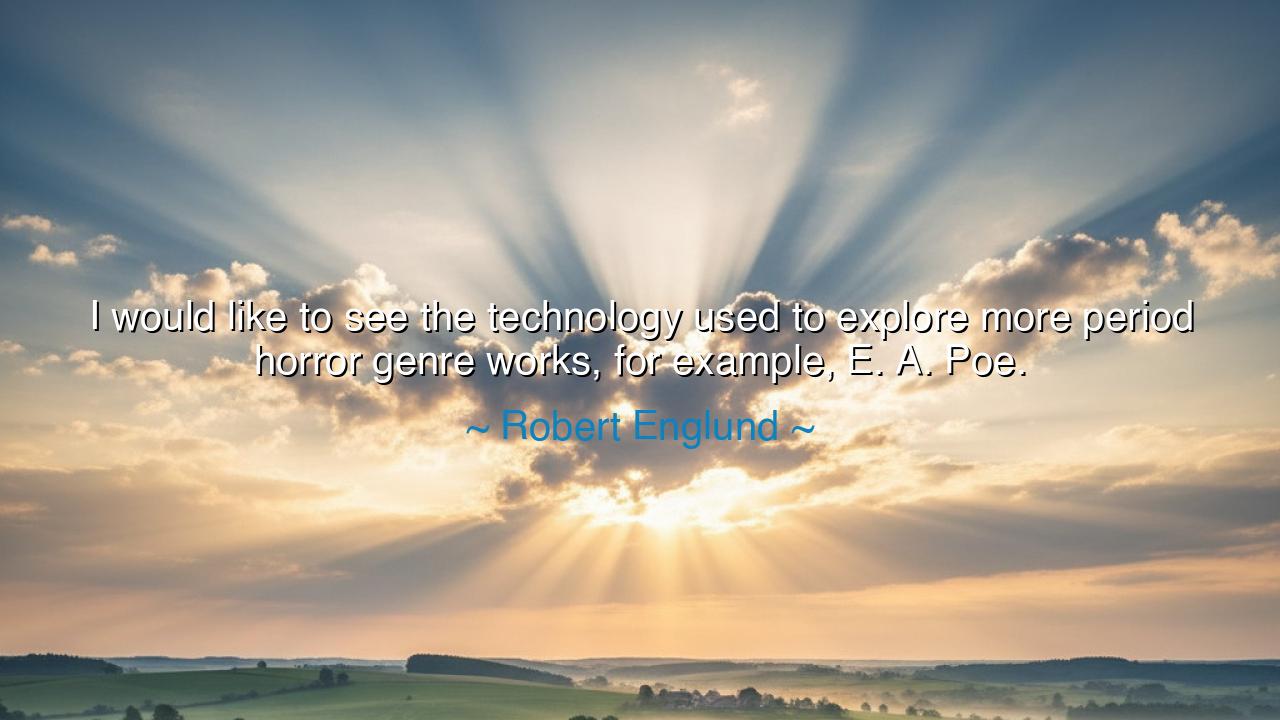
I would like to see the technology used to explore more period
I would like to see the technology used to explore more period horror genre works, for example, E. A. Poe.






Hear the words of Robert Englund, master of shadow and terror, who once declared: “I would like to see the technology used to explore more period horror genre works, for example, E. A. Poe.” This is not merely the musing of an actor, but the cry of one who knows that the tools of the present can give new breath to the nightmares of the past. It is a call to remember the roots of horror, to take the flame kindled by the great storytellers of old and carry it forward with the instruments of a new age.
When Englund speaks of technology, he invokes the powers of our time—cinema, special effects, digital worlds, immersive soundscapes—tools that can conjure visions and terrors once confined to the page. Yet he does not wish these tools to be wasted upon hollow spectacle. He longs for them to serve the masters of the craft, the ancient bards of dread, such as Edgar Allan Poe, whose words dripped with madness, death, and despair. For though centuries separate us from Poe, his shadows still reach into our hearts. And now, with modern tools, those shadows may be painted larger, deeper, more vivid than ever before.
Consider the enduring power of Poe himself. In his tale The Tell-Tale Heart, no specter walks the earth, no monster claws at the door—only the guilty mind betrays itself to madness. And yet, who can read it without feeling the pounding of that heart in their own ears? Poe’s genius lay in crafting terror from the human soul itself. If today’s technology could place us inside that room, hearing the heartbeat, seeing the sweat of guilt upon the brow, would not the horror be made even more consuming? Here lies the vision Englund longs to see fulfilled: the union of timeless storytelling with the immersive powers of modern craft.
History itself has shown how new mediums rekindle old tales. When the invention of the printing press spread the stories of ancient poets, voices once bound to the few were given to the many. When film emerged, legends from Shakespeare to Shelley took new form upon the screen, their power magnified for generations yet unborn. So too with horror: Mary Shelley’s Frankenstein leapt from page to film, and Bram Stoker’s Dracula took flight upon celluloid wings. Each age retools the classics with its own technology, proving that true art never dies—it only awaits new vessels.
But Englund’s yearning also carries a warning: technology without reverence becomes empty. It dazzles the eye but fails the soul. To take Poe’s works and treat them as mere spectacle would betray their depth. Horror is not merely the scream; it is the slow dread, the creeping unease, the confrontation with mortality. The challenge, then, is to wield new tools without losing the ancient essence—to let technology serve the story, not overshadow it.
The lesson for us is this: in all things, let progress honor tradition. When you create, do not forget those who came before you. When you innovate, do not sever your roots, for roots nourish the tree even as its branches stretch toward the sky. As Englund suggests, let us use the powers of today not only to forge the new, but to reawaken the treasures of the past, so that their truths and terrors may not be forgotten.
Practically, this means reading the works of the old masters, studying their craft, and then asking how today’s tools might deepen their impact. It means resisting the urge to create only what is quick and shallow, and instead daring to bring depth into the modern world. Whether in art, in storytelling, or in one’s own work, let each of us strive to blend the wisdom of the past with the strength of the present.
Thus Robert Englund’s words stand as both homage and challenge: to honor the period horror genre, to remember Poe, and to recognize that technology is a servant, not a master. If we heed this, then the ghosts of the past will walk again—not as pale imitations, but as living terrors, clothed in the power of our own age, whispering their lessons into the ears of the generations yet to come.






AAdministratorAdministrator
Welcome, honored guests. Please leave a comment, we will respond soon